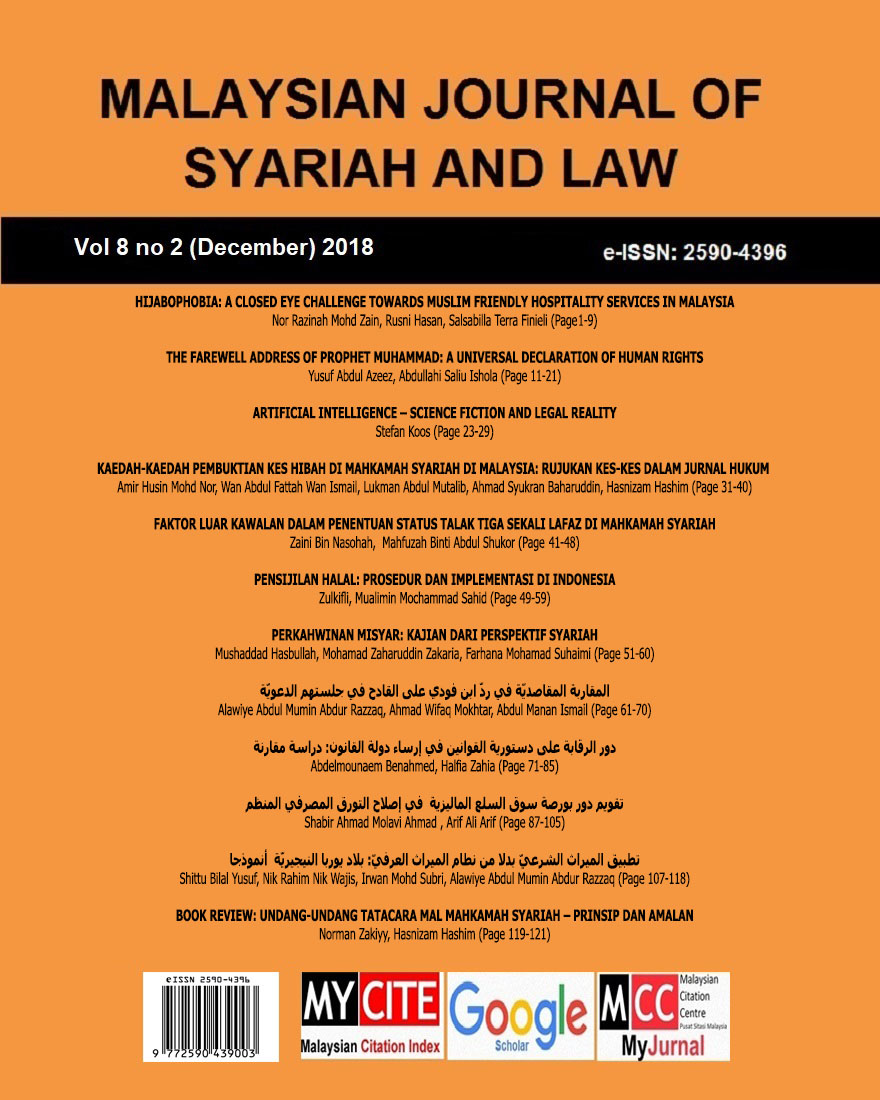ARTIFICIAL INTELLIGENCE - SCIENCE FICTION AND LEGAL REALITY
DOI:
https://doi.org/10.33102/mjsl.vol6no3.135Keywords:
AI, Artificial Intelligence, Human dignity, Personification, Legal PErson, Strict LiabilityAbstract
Artificial Intelligence (AI) is being integrated into systems influencing decisions, analysing complex situations and conducting processes, which may be dangerous for humans. Yet AI is not strong enough to be able to feel or suffer and maybe it never will. However, the complexity of AI deciding will grow with the technical progress and it should be discussed, how far we are willing to integrate future AI systems into important social processes such as legal decisions or teaching. The article seeks to give an overview over constitutional problems of an integration of strong AI systems into social deciding processes. It analyses the ability of AI to have similar legal positions as natural persons and corporations in the light of the question, whether AI can be an agent for ethic. Furthermore, it presents options of a liability for damages caused by the activity of AI systems. The article is the paper of a presentation on the topic held by the author on October 25, 2018 at Universiti Sains Islam Malaysia (USIM).
Downloads
References
Bostrom, Nick. (2016). Superintelligence: Paths, Dangers, Strategies. (Oxford University Press).
Fischer-Lescano, Andreas. (2018). Natur als Rechtsperson, Zeitschrift für Umweltrecht (ZUR) 2018, 205.
Flume, Hans. (1972). Gesellschaft und Gesamthand. Zeitschrift für das gesamte Handelsrecht (ZHR) 136 (1972), 177.
Gierke, Otto von. (1895). Deutsches Privatrecht I. (Leipzig).
Hassan, Halyani; Ghadas, Zuhairah Ariff Abd; Abdul Rahman, Nasarudin. (2012). `The Myth of Corporate Personality´ - A Comparative Legal Analysis of the Doctrine of Corporate Personality of Malaysian and Islamic Laws. Australian Journal of Basic and Applied Sciences 6 (11), 191.
Herdegen, Matthias. (2018). Comments on the Präambel and on Art. 1 GG. In: Maunz/Dürig, Grundgesetz. 84th ed (Munich: C.H.Beck).
Koos, Stefan. (2017). Ethic and Social Responsibility in the Competition Law. In: Proceedings to the International Seminar `Developing a Legal System to Promote Social Welfare´ August 23-24, 2017, Trisakti University Jakarta.
Koos, Stefan. (2002). Fiduziarische Person und Widmung – Das stiftungsspezifische Rechtsgeschäft und die Personifikation treuhänderisch geprägter Stiftungen. (Munich: C.H.Beck).
News Desk, Inquirer.net. Meet Sophia: The First Robot Declared A Citizen by Saudi Arabia. The Jakarta Post. 30 Oct. 2017.
Nilsson, Nils J. (2009). The Quest for Artificial Intelligence. A History of Ideas and Achievements. (New York: Cambridge University Press).
Savigny, Friedrich Carl von. (1840). System des heutigen römischen Rechts II. (Berlin).
Qusthan Firdaus. Is Artificial Intelligence Subject to Ethics? The Jakarta Post 6 Oct. 2018.
The German Civil Code § 823 I BGB (english version of the BGB http://www.gesetze-im-internet.de/englisch_bgb/ (visited November 7, 2018).

Downloads
Published
Issue
Section
License
Copyright (c) 2018 Stefan Koos

This work is licensed under a Creative Commons Attribution-NonCommercial 4.0 International License.













































